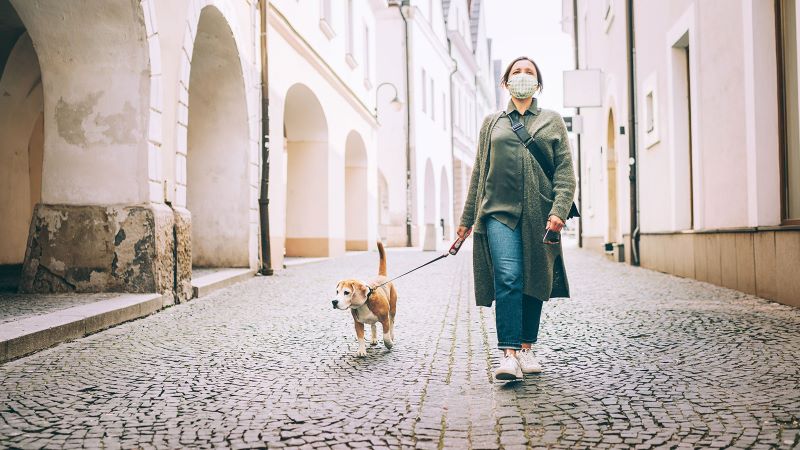I heard a podcaster mention that he didn’t like the term “social distancing” because it implies we should stop being social during this time. He prefers physical distancing, since that is what we are being asked to do after all. We are being asked to limit human interaction and to maintain at least 6 feet of distance from person to person living outside of our home. But does this same rule of thumb apply to our dogs?
Let’s look at some of the dos and don’ts when it comes to physical distancing with our pets.
Keep walking your dog.
Walking your dog provides an outlet for extra energy and lengthens and improves quality of life--for you and your pet! The fresh air and exercise can lift your spirits, alleviate stress, and improve digestion. See our post, 4 Reasons to Get Outside and Walk for more benefits of including a daily walk with your pal.
Shower extra love on your pets.
Petting and loving on your pup can lower the stress hormone, cortisol. According to a University of Missouri–Columbia study, petting a dog for just 15 minutes can release serotonin, prolactin, and oxytocin – all feel-good hormones. Petting a dog is a simple act with a big payoff!
Communicate with your vet.
Trust that your veterinary practice is doing the best they can to maximize the safety of you and your pet and their veterinary team. Many practices are offering curbside service while you wait in your car. Other vets will take your pet to a treatment area to minimize the time technicians, veterinarians, and clients spend in exam rooms together. See PetMD’s post, Should I go to the Vet or Wait for more guidelines on making the most informed decision.
Don’t go to dog parks or busy trails.
Since the jury is still out on how close is too close when it comes to the virus spreading from person to person, it is a good idea to give a wide berth when passing people on trails. In this case, the road less traveled is the better bet. It may be best to stick to neighborhood sidewalks and quiet streets, where you can cross to the other side of the road when passing others.
Don’t interact with your pet if you get sick with COVID-19.
According to an article by Catherine Barnette, DVM, "If you have been diagnosed with COVID-19, public health officials recommend that you restrict contact with pets as a precaution until more information is known about the virus." Wash your hands for at least 20 seconds with warm water and soap after coughing, sneezing, or blowing your nose. Also make sure to wash your hands before interacting with your dog and limit interactions (as hard as that may be) until you are feeling better.
Don't forget to have a pet caretaker in place.
If you become sick, you may need a family member or friend to take on the care of your pet. Have a pet caretaker in place should you have to be hospitalized or if your pet may need emergency care and you are unable to leave the house. What happens if your pet gets hurt or sick and needs to visit the vet? This pet caretaker can taxi your pet to the vet and act as guardian until you are safe to continue caring for him. If you are unable to find someone to take your pet, and you are enrolled in a pet insurance policy with PetPartners which covers the 24/7 vet helpline to determine if your pet’s symptoms warrant a trip to the vet. If they do, notify your veterinarian of your health status before taking your vet for care. If your veterinarian recommends you take your pet to the hospital, wear a mask and gloves and keep a safe distance between you and any other hospital workers or patients.
Preparation is key!
Of course, the best defense is always a good offense. Your pet should visit your veterinarian once a year for an annual wellness check. If you have been keeping up with your pet(s)’ regularly scheduled vet appointments and checkups, you can rest assured (barring any emergencies or sudden sickness) your pet is going to be ok delaying a routine health exam until veterinary clinics are open again. Just make sure to reschedule any well-checks once your vet reopens for regular visits. While you have some extra time, consider shopping for pet insurance and enrolling your pet in a plan to help protect you against unexpected vet bills. Get a quote today!

